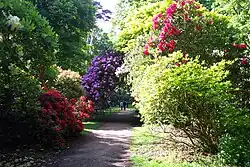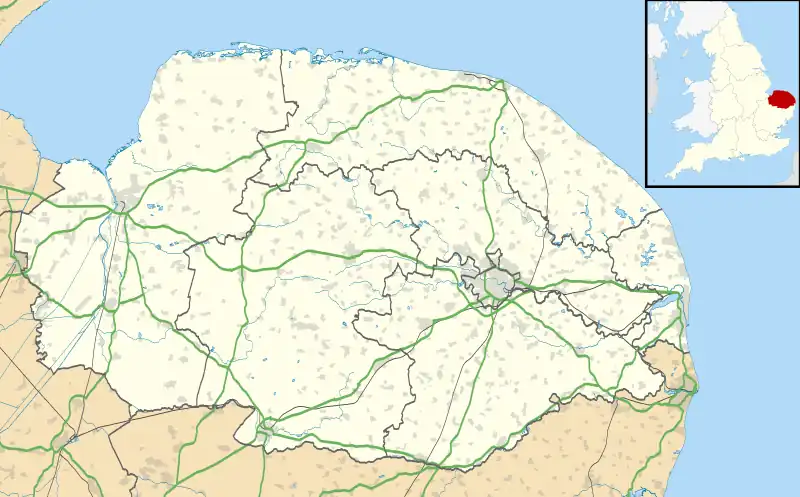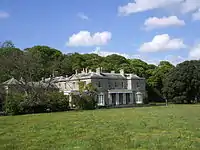Sheringham Park
Sheringham Park is a landscape park and gardens near the town of Sheringham, Norfolk, England.[1] The park surrounds Sheringham Hall, lying mostly to its south. The hall is privately occupied, but Sheringham Park is in the care of the National Trust and open to visitors.
| Sheringham Park | |
|---|---|
 Sheringham Park. The rhododendron gardens | |
 Sheringham Park within Norfolk | |
| Location | Sheringham, North Norfolk, East of England, Norfolk |
| Coordinates | 52°55′48″N 01°10′30″E |
| Established | July 1812 |
| Owned by | In the care of the National Trust |
| Website | www |
The park was designed by Humphry Repton (1752-1818) who presented his proposals in July 1812 in the form of one of his Red Books.[2] He described Sheringham as his "favourite and darling child in Norfolk". Abbot and Charlotte Upcher bought the estate in 1811, and successive generations of the Upcher family did much to develop the estate, the hall and the park, as well as building a school.
There are fine mature woodlands and a large variety of rhododendrons and azaleas. In the early 20th century, Henry Morris Upcher obtained rhododendron seeds of various types from plantsman Ernest "Chinese" Wilson. Plants from this source which can found at the garden include Rhododendron ambiguum, calophytum and decorum, among others.[3] Many other species of tree and shrub are represented in the garden, including fifteen kinds of magnolia, large specimen pieris. Among the other trees are maples, acers, styrax, eucryphia, pocket handkerchief tree davidia involucrata and a fine example of the snowdrop tree. Several overlook towers provide good views over the gardens, and of the nearby coast and surrounding countryside. A garden temple was constructed in the Park in 1975.[4]
Location
Sheringham Park is located 2 miles south west of the coastal town of Sheringham, 5 miles west of Cromer and 6 miles east of Holt. The main entrance is at the junction of the A148 Cromer to Holt road and the B1157 road to Upper Sheringham. The Norfolk Coast Path passes through the property. A car park, cafe and visitor centre are near the main entrance. Waymarked paths through the estate link the gardens and visitors centre to the coast, and to the Weybourne station on the North Norfolk Railway, a preserved steam railway. Pedestrian access to the park is from the village of Upper Sheringham, which is adjacent to the park.
Visitor centre
The visitor centre is located within Wood Farm Barn at the southern end of the park, the barn also houses an exhibition of the history and the wildlife of Sheringham Park. Together with a reception desk and information kiosk. From the reception there are hearing loops available. Wheelchairs and powered mobility vehicles available at no charge although it is necessary to take a small test before use. The refreshment kiosk is also at Wood Farm Barn.
The exhibition area explores the life and work of the landscape architect Humphrey Repton and also of the Upcher family who owned the park. There are several examples of Humphrey Repton's red book of plans for the designs of the park. Part of the exhibition area has an area dedicated to the wildlife and nature of the park with identification games and interactive displays.
Volunteers
The park has a group of regular volunteers who help the garden staff with their duties. Under the guidance of the head gardener they undertake tasks such as pruning trees and other tasks, and generally keeping the park in a condition fit for visitors.
Gallery
 The Rhododendron gardens.
The Rhododendron gardens. View from one of the overlook towers.
View from one of the overlook towers. Treescape in the gardens
Treescape in the gardens Rhododendron in full bloom. May 2018
Rhododendron in full bloom. May 2018
Sheringham Hall

The Regency, Grade II listed building is finished in grey, gault, Lincolnshire brick was designed and built by Humphry Repton and his architect son, John Adey Repton. Due to the Norfolk coast's glacial winds, Repton chose a south facing site in the lee of a wooded hillside. In July 1813 the Upcher family laid the foundation stones and the family hoped to move into the house in the summer of 1817, but the owner of the estate Abbot Upcher fell ill and died in 1819 at the age of 35. The hall remained empty for 20 years until Henry Ramey Upcher completed the house in 1839.[3]
The hall's 71-year lease was offered for sale at £2.35 million in 2008.[5]
References
- Ordnance Survey (2002). OS Explorer Map 252 - Norfolk Coast East. ISBN 0-319-21888-0.
- Landscapes of Taste: The Art of Humphry Repton's Red Books (Classical Tradition in Architecture) (Hardcover) ISBN 0-415-41503-9
- Zealand. K. National Trust–Sheringham Park guide (1998) Retrieved 25 November 2008
- Gray, Tracey (17 February 2011). "Rhododendrons blooming early in Sheringham Park". North Norfolk News. Retrieved 16 November 2021.
- "Sheringham Hall's lease up for sale". Country Life. 17 January 2008. Retrieved 16 November 2021.
External links
Further reading
- Repton, Humphry, "Sheringham Red Book" (facsimile edition), Basilisk Press, 1976.